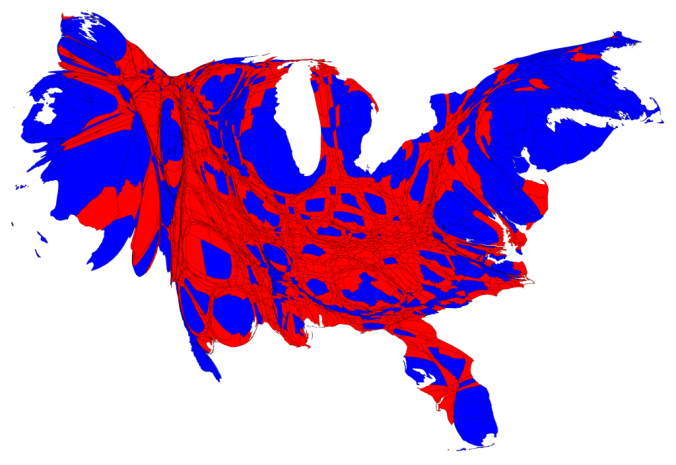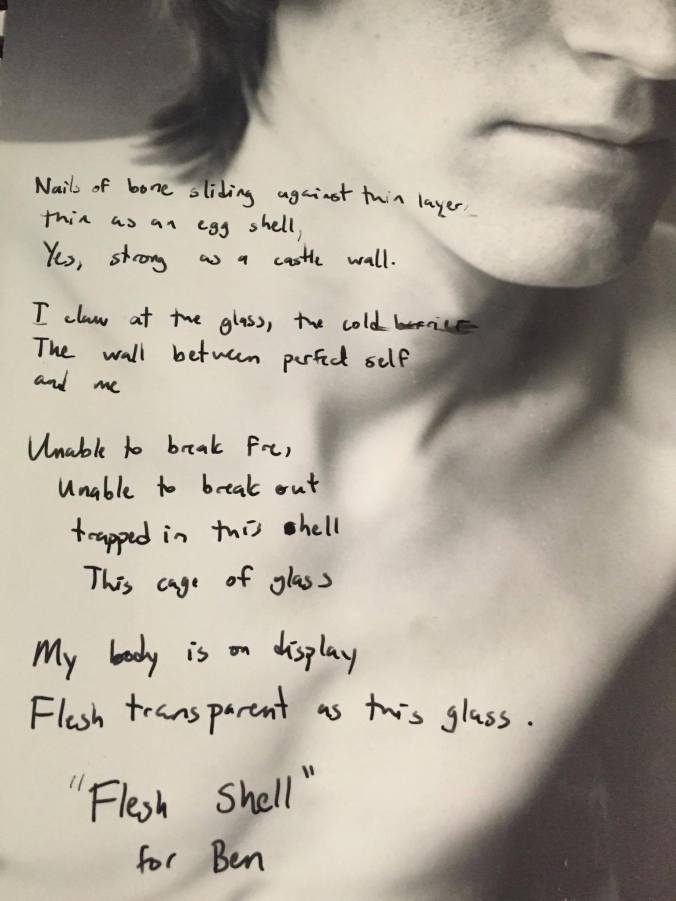There have been several pieces trying to make sense of the election. Cracked published one detailing the lives led by people in rural America. Vanity Fair released another about the concerns of women stopping just shy of suggesting that women care about their immediate family more than anything else. And I’m writing one now. Asking who is the 1%? And answering that if you take everyone that voted for Clinton and Stein you probably have 99% of the 1%. And, unlike the usage of Bernie Sanders and #occupywallstreet, I mean geographically. The way that anthropologists distinguish ethnic groups. They were probably more right switching to that than they knew, or maybe they did know and were genius, but essentially American cities could probably be considered an ethnicity.

This sweet looking bird is an election cartogram of 2012
The above map uses population to scale the counties and colors them to show if Romney or Obama won in 2012.See the blue spot around Virginia? That’s 7 counties. About 150×100 miles around Washington, D.C. Lake Michigan is the same size as Texas when population density is used because of Chicago. The bottom part of the top right wing is New York City. The big blue spot on the west with the islands off the coast is Los Angeles County. One County equals Florida. To put it another way, L.A. Co. is the 11th most populous state between Michigan and New Jersey. New York City is the 12th. And Cook County, where Chicago resides, is the 23rd. Two counties and one city (which is 5 counties) are in the top 25 populations by State. D.C. just misses the cut.
So as the election results came in I’m sure you looked at those maps and said that’s so much red. The people around me said the same. It looked overwhelming. And it is. But to people living outside of major cities it’s overwhelming that cities can decide everything. This election proved that Pennsylvania has more rural area than cities. And you might wonder what my point is (I geek out over maps, here’s my favorite)
My point is we just didn’t get this election. We didn’t get what it was about. We wanted to talk about racism, misogyny, sexism, transphobia, homophobia, xenophobia because of what Trump said. When we could have focused back to the economy. Notice how Bernie even stopped talking about the economy after Donald Trump? What happened? We were so fired up about that. Well, you know how we make fun of people in the country for losing their mind when we suggest gay rights or abortion? I’m suggesting that during this election they weren’t losing their minds. We were. People in cities went into a panic over Donald Trump nearly everyday. And instead of looking at ourselves we made fun of C.N.N. (which you should totally do, it’s awful) People who lived in cities and voted for Hillary were the crazed population. And we didn’t know it because we live in this echo chamber. I don’t even cross a river unless I absolutely have to. And that’s only 1 mile from my apartment. We travel further than anyone did in their lifetimes a century ago in a day, to take a weekend in another city, but week-to-week, we probably travel less than the fields plowed 100 years ago.
We have different focus. Most of our ideas are, and have been, good progress to be more inclusive, utilitarian, caring, and environmentally aware, but while Trump was talking about policy, no matter how minimal in detail, we talked about every bad thing Trump said. And we should, possibly, consider that maybe we would have won if we stuck to policy. Which is ironic because Clinton has a command of policy, both current and proposed, that eclipses nearly everyone else in domestic and foreign affairs. But the news wasn’t focused on that, nor did broadcast do live stage plays of Clinton’s numerous policy proposals from her campaign web page. And so, just like me, living at the bottom of our society and wanting a higher minimum wage and better jobs, people in rural areas knew that it hasn’t gotten better under Obama economically, and before that it was a slow decline from the beginning of post-industrialization. When Clinton didn’t speak specifically about policy and said Trump was unfit, it probably looked like someone who didn’t have a plan (because she was an insider) to someone who did have a plan to try and win.
That sounds so far fetched. But, I thought about a conversation I had with an activist in the Black Lives Matter movement about racism comparison between the North and the South. I grew up in Virginia and had family in North Carolina. Now I live in Pennsylvania. Would you believe that I meet more obviously racist people here everyday than I did in the south? Racism in the North scares me more. It’s the racism that believes people of different races are fundamentally different and have to be fundamentally different. I constantly hear “You don’t act like a black person.” now and almost never did in the South. Most people didn’t care as long as you tried to fit in (and hey, I’m trans, I also caused a problem). This person considered both types to be exactly the same. There wasn’t a difference. It was academic. It was intellectual. Racism is racism is racism. Even though I had confronted them with examples, lived examples, of a difference. If you want to learn where violence erupted along racial divisions in America you’ll notice how during the 20th century they moved out of the South almost entirely. I don’t think we’re viewing racism wrong, but I don’t think we’re being honest enough about who the actual racists who act in racism are in this country. We are scapegoating people from outside the cities and turning a blind eye from ourselves.
I’m not saying the KKK doesn’t exist. It does. So do Nazis and other white supremacist groups. But they don’t make up all of Trump’s supporters.
We get angry when white people don’t care about black people or care less than white people. We fume when we hear someone ask a street harasser “would you say that to your mother” because it suggests women owned by a man are the only ones that matter. These are great, but that thinking works in a city. People aren’t concerned with things they don’t interact with on a daily basis. Learning feminism, queer history, black politics, whatever think pieces we discuss over mimosas at brunch would strengthen and enrich and make better everyone. But it doesn’t help when there aren’t jobs in your hometown. And you don’t have money to move. And you can’t afford college. And your car breaks down so you can’t get to the one job you did have because there is no public transit.
Hillary Clinton wanted to address all of that. We knew she did, and we have so much privilege in the 1% that a lot of us voted for other candidates, or not at all. We even have so many people in our high-rise, studio, updown, kitchenette-living-room-combo, or homeless shelter castles that it only mattered because of the Electoral College and still cast more votes for Hillary.
The problem is that in a city, living in a shelter is a privilege. Because cities have them. Because we can.
I’m not saying that we shouldn’t address the staggering amount of wealth that flows upwards. I’m not saying we shouldn’t push for student debt forgiveness and affordable college or a higher minimum wage. I’m saying that we look really silly speaking about those things to people about to lose their house. When they’re living with relatives because they lost their job. Our ideas are wonderful, but rural america needed them 20 years ago. If they were bothered, and many probably were, by the horrible things Trump said they held their nose and voted because Trump at least had the chance to change something. And he wasn’t going to go slow in changing things. Or incremental steps as a progressive, but a progressive who likes to get things done as Clinton said. We are the 1%. Laughing at the hicks while applauding ourselves. And now we’re the 1% being aghast that they have a voice and champion that can hurt us.
